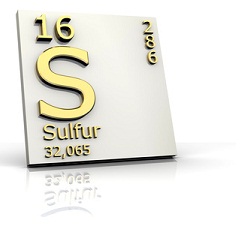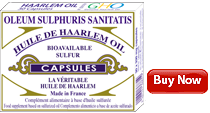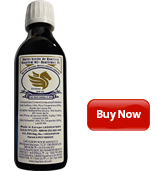Sulfur
The sulfur requirement for our body is 800 mg per day!
Sulfur (sulvere in Sanskrit / sulphurium in Latin), known since ancient times, was used by the Romans as a dermatological medicine. It is quoted in the Bible and in Homer's Odyssey and mentioned in the 9th century BC as "keeping vermin at bay".
IDENTIFY

-
“S” symbol.
-
No. 16 between phosphorus and chlorine in the periodic classification of the elements.
-
Atomic mass = 32.06.
Sulfur is abundant in nature. It occurs in its original state or in the form of sulfides or sulfates. It constitutes the wealth of numerous thermal waters with characteristic scents. Sulfur has very useful applications in the therapeutic field.
BIOLOGICAL ROLES AND NEEDS FOR THE ORGANISM

Sulfur is a trace element that is present in all cells.
Although most of the sulfur intake comes from sulfur-containing amino acids, it is still necessary to have an intake in non-oxidized organic form (garlic, spice, eggs).
It is mainly involved in the structure of proteins and the respiration of cells. Sulfur is therefore essential for the composition of the structure of proteins, more precisely (and scientifically speaking) it is one of the elements of the tertiary structure of proteins. Sulfur is part of the composition of essential amino acids (methionine, cystine), certain vitamins (thiamine or B1, biotin or B6) and coenzyme A involved in many metabolisms. Sulfur is a trace element that is necessary for the building of bones, tendons, joints and teeth.
It is a trace element that is particularly useful in the purifying functions of the liver. Sulfur is involved in several essential functions (as an agent), such as stimulation of cellular respiration, neutralization and elimination of toxins, and is anti-allergic. In addition, sulfur is often used for certain therapeutic applications and in certain thermal waters.
SULFUR IS A MACRO ELEMENT NECESSARY FOR THE PROPER FUNCTIONING OF THE ORGANISM.

Sulfur is often used for certain therapeutic applications and is used in the composition of thermal waters.
Although sulfur intake largely comes from sulfur-containing amino acids, it is still necessary to have an intake in non-oxidized organic form (garlic, spices, eggs, Haarlem oil).
- Prev
- Next >>







